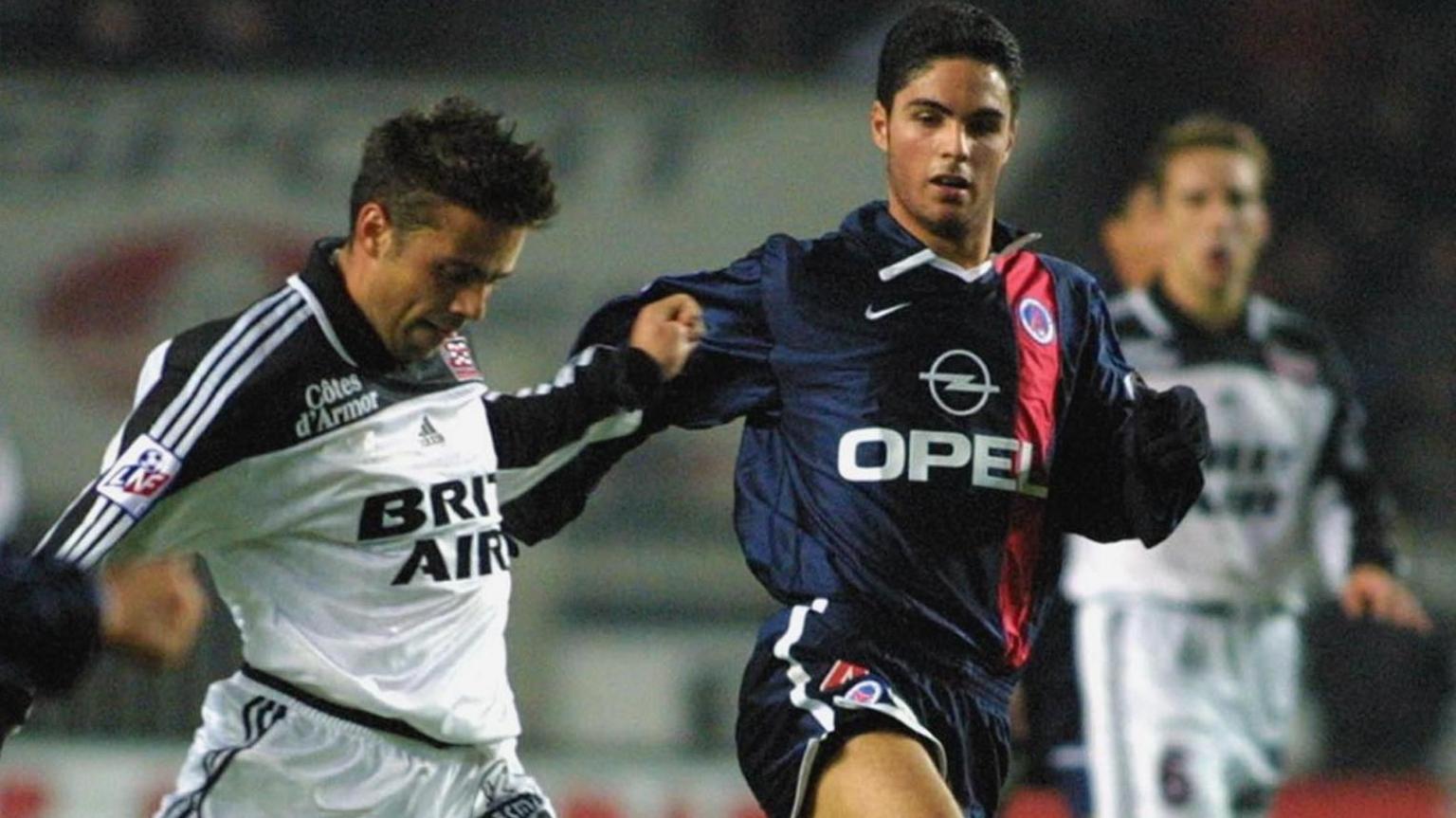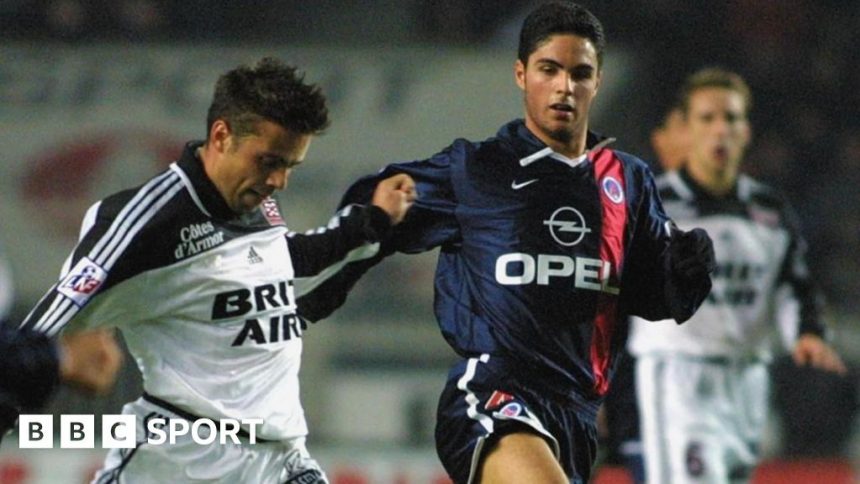Learning from Pochettino & aiding Okocha – how PSG loan shaped Arteta

Mikel Arteta made 53 appearances for Paris St-Germain during an 18-month loan spell
-
Published
In January 2001 Mikel Arteta left Barcelona for Paris St-Germain in a move that would ultimately help transform one of the most intelligent midfielders of his generation into one of the game’s top coaches.
It was where he first displayed the leadership qualities that have seen him progress to Arsenal manager and he will welcome PSG to Emirates Stadium on Tuesday in the Champions League.
The 18-year-old Arteta, faced with the impossible task of usurping the likes of Pep Guardiola, French World Cup winner Emmanuel Petit, Dutch international Phillip Cocu and Xavi Hernandez in Barcelona’s star-studded midfield, had moved to the French capital on an 18-month loan deal.
PSG were yet to become French football’s dominant force but had progressed to the second group stage of the Champions League and boasted several big names of their own, including Jay-Jay Okocha, Nicolas Anelka and Mauricio Pochettino.
A young Brazilian by the name of Ronaldinho would join the club from Gremio later that year.
Arteta barely spoke any French, but a small contingent of Spanish speakers helped him settle quickly into life in Ligue 1 and despite his tender years, the teenager made a big impression at the Parc des Princes.
‘He had the football brain’
A young Arteta (3rd left) in training with his PSG team-mates
One of the first players to take Arteta under his wing was Pochettino, who the Spaniard has since described as his “big brother” and “football father”.
The Argentine, 10 years his senior, also arrived in January 2001 after leaving La Liga side Espanyol and struck up a close bond with his new team-mate as they shared a hotel for the first three months of their time in Paris.
Arteta’s leadership skills, according to Pochettino, were apparent from the outset.
“He was already a coach,” he said of his former PSG colleague in 2023. “He was giving advice to me and the others. [I’d] say ‘wow!’ – the character, the personality, the charisma. He already had the football brain.”
Arteta was tasked by manager Luis Fernandez – who had already tried to sign the teenager while in charge of Athletic Bilbao – with orchestrating play from a deep-lying midfield position, a role he fulfilled with a confidence and maturity that belied his age.
“Fernandez asked him to play simply and help provide a platform for more creative talents like Okocha, and he carried it out brilliantly,” French football expert Matt Spiro told BBC Sport.
“Arteta was a quiet man but already displayed the steely determination we see in him today. Like most Barcelona players he was tactically excellent, but the most surprising and impressive aspect of his game, given his age, was his tactical awareness.”
Arteta made 11 appearances before the end of the campaign, scoring his first PSG goal in a 2-2 draw with Lille on the season’s penultimate weekend. Despite his fine start, however, Fernandez’s side ended that term in inauspicious fashion.
After losing 4-0 to Auxerre in the French Cup fourth round – Arteta’s debut for the club – they finished bottom of their second-round group in the Champions League and only narrowly clinched a top-half finish on the final day of the season.
But better times were just around the corner.
PSG’s midfield mainstay – but not for long
PSG manager Luis Fernandez (left) had tried to sign Arteta (right) during his time in charge of Athletic Bilbao
Victory in that summer’s Intertoto Cup earned Les Parisiens a place in the first round proper of the 2001-02 Uefa Cup.
Including those early-season European games, PSG won eight and drew 10 of their first 18 matches of the campaign, eventually suffering their first defeat at Bordeaux on the final day of September.
Arteta played the full 90 minutes in all but one of his 16 league appearances before Christmas, as PSG placed themselves firmly in the mix for a return to the Champions League the following season.
“The team had style on the pitch,” Fernandez, who remembers Arteta as a player with “good etiquette and behaviour”, told The Athletic last year. “They always met my expectations in relation to the system and the organisation. We were able to make them evolve and grow as players. I am happy to have been able to help them, and Mikel.”
PSG would again fall short in France’s domestic cup competitions, losing in the French Cup quarter-finals and League Cup semi-finals to Lorient and Bordeaux respectively.
But it was a penalty-shootout defeat by Rangers in the Uefa Cup round of 32 that would prove costly in more ways than one, as it marked the beginning of the end of Arteta’s time at the club.
The Glasgow outfit, who knew little of the teenager before the first-leg meeting in late November, were so impressed by his performance across both matches that they decided to offer Barcelona – who by that time had Andres Iniesta knocking on the first-team door – £6m for his services.
Fernandez had reportedly made the permanent acquisition of Arteta one of his top priorities, but despite holding a purchase option for the midfielder, PSG were beaten to his signature by Alex McLeish’s side, who agreed a deal in March for Arteta to join in the summer.
‘A major success’
Arteta caught the eye of the Rangers hierarchy during a Uefa Cup meeting in late 2001
Confirmation of his imminent departure did little to sour Arteta’s relationship with the fans at PSG, who ended their Ligue 1 campaign in fourth spot – insufficient for a Champions League return but a marked improvement on ninth the previous year, and enough at least to guarantee Uefa Cup football for another season.
Arteta ended 2001-02 on 42 appearances in all competitions, his modest return of eight goal involvements misrepresentative of the overall impact he had during his loan spell.
As PSG supporters prepare to travel to Emirates Stadium on 1 October, conversations among a certain vintage may turn to their former midfield orchestrator who, in the intervening decades, has blossomed into one of the brightest tactical minds in the game.
“Arteta was a major success during his 18 months at PSG,” said Spiro. “Everybody was disappointed they didn’t manage to keep him longer.
“They didn’t win any trophies, but fans still recall that period – and Arteta – with great fondness.”
-
-
Published26 July 2022
-







